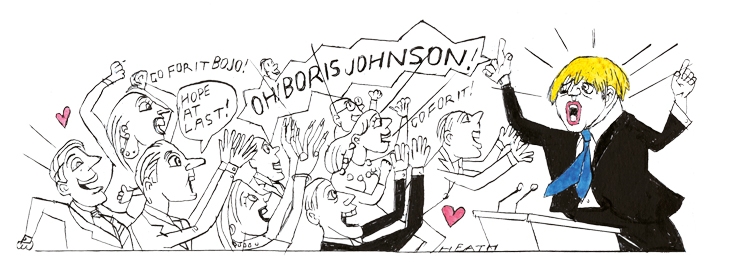Home
Boris Johnson, the former foreign secretary, played a well-nourished Banquo’s Ghost at the Conservative party conference, where Theresa May, the Prime Minister, declared that Britain after Brexit would be ‘full of promise’. She had insisted that the Chequers proposals for Brexit were the only ones possible. Mr Johnson called them ‘deranged’. Mrs May felt obliged to tell Andrew Marr on television: ‘I do believe in Brexit.’ Philip Hammond, the Chancellor of the Exchequer, mocked Mr Johnson’s way of speaking: ‘Boris sits there,’ he told the Mail on Sunday, ‘and at the end of it he says, “Yeah but, er, there must be a way, I mean, if you just, if you, erm, come on, we can do it, Phil, we can do it.” ’ Mr Johnson mocked Mrs May, who once confessed to having run through a field of wheat, in front-page pictures showing him running through a field of grass. To a large crowd on the conference fringe he advocated house-building and said ‘the authors of the Chequers proposal risk prosecution under the 14th-century statute of praemunire’. Jeremy Hunt, the Foreign Secretary, said: ‘The EU was set up to protect freedom. It was the Soviet Union that stopped people leaving.’ The party conference app was found to reveal delegates’ personal details to anyone if their email was typed in.
To take people’s minds off Brexit, Mrs May announced that couples of different sexes would be able to form civil partnership and that, for the ninth year, fuel duty would be frozen. She promised an immigration policy favouring high-skilled workers, with no preferential treatment for EU citizens. Gavin Williamson, the Defence Secretary, said he would safeguard the future of Britain’s two amphibious landing ships, HMS Bulwark and HMS Albion. Chris Grayling, the Transport Secretary, announced easier ways of gaining compensation for late trains. The government resurrected a plan to stop restaurants taking employees’ tips, though there were no plans to stop taxing them.
Primera Air, which had 15 aeroplanes, collapsed financially, leaving some passengers stuck abroad. The University of Brighton said it was not promoting prostitution after the Sex Workers’ Outreach Project was given a stall at a freshers’ fair. Cambridge University worked on ways to repel the rich in favour of poorer candidates with poorer A-levels. Manchester University students’ union enjoined the use of ‘jazz hands’ in place of clapping, lest anxious people be startled. A plague of avian malaria left Telford Exotic Zoo with nothing but plastic penguins to put in its newly built enclosure.
Abroad
In America, senators delayed a vote on the appointment of Brett Kavanaugh to the Supreme Court pending an FBI investigation ordered by President Donald Trump after sensational testimony by Mr Kavanaugh and Professor Christine Blasey Ford, whom he denies sexually assaulting as a teenager in the 1980s. Elon Musk was ordered to step down as chairman of Tesla and pay a $20 million fine after tweeting misleadingly that he had ‘funding secured’ to take the company into private ownership. A Facebook security breach was found to have affected 50 million users. Customers complained that Apple’s new iPhone XS and XS Max smartphones failed to charge reliably. Amazon agreed to raise the wages of its lowest-paid workers in America to $15 an hour. Europe easily regained the Ryder Cup from America.
Many of the dead from an earthquake and tsunami in Indonesia were buried in mass graves; the number of 1,400 confirmed dead was expected to rise substantially. Troops from North and South Korea began to remove some of the 800,000 landmines along their border. President Erdogan of Turkey opened one of Europe’s largest mosques in Cologne during a state visit to Germany. Hassan al-Kontar, a Syrian seeking asylum, was taken into police custody after living for nearly seven months in Kuala Lumpur International Airport.
The Cern nuclear research establishment suspended Professor Alessandro Strumia of Pisa University from working with it after he said in a lecture that ‘physics is not sexist against women’. Donna Strickland, from Canada, became the third woman to win the Nobel Prize in physics since Marie Curie in 1903. Charles Aznavour, the French singer, died aged 94. A court in Saudi Arabia, where musical instruments are regarded as haram, prohibited a woman from marrying a man because he played the oud. CSH






Comments